Commercial Law Assignment: Analysis of Contract Law Issues, Part B
VerifiedAdded on 2021/05/27
|6
|1588
|58
Homework Assignment
AI Summary
This assignment solution analyzes two key issues in commercial law. The first part examines whether a valid contract was formed despite a false statement in an advertisement, exploring concepts like offer, invitation to treat, misrepresentation, and the Consumer and Competition Act. It discusses the application of relevant case law, including Fisher v Bell and Carlill v Carbolic Smoke Ball Co, to determine potential damages. The second part addresses the remedies available for breach of contract, specifically when a van sold was leased, and the implications of a non-functional loader. It covers remedies like rescission, specific performance, and damages, referencing cases like Addis v Gramophone and Victoria Laundry (Windsor) Ltd v Newman Industries Ltd to determine the extent of Barry's claims. The analysis provides a comprehensive understanding of contractual obligations and the legal recourse available for breaches.
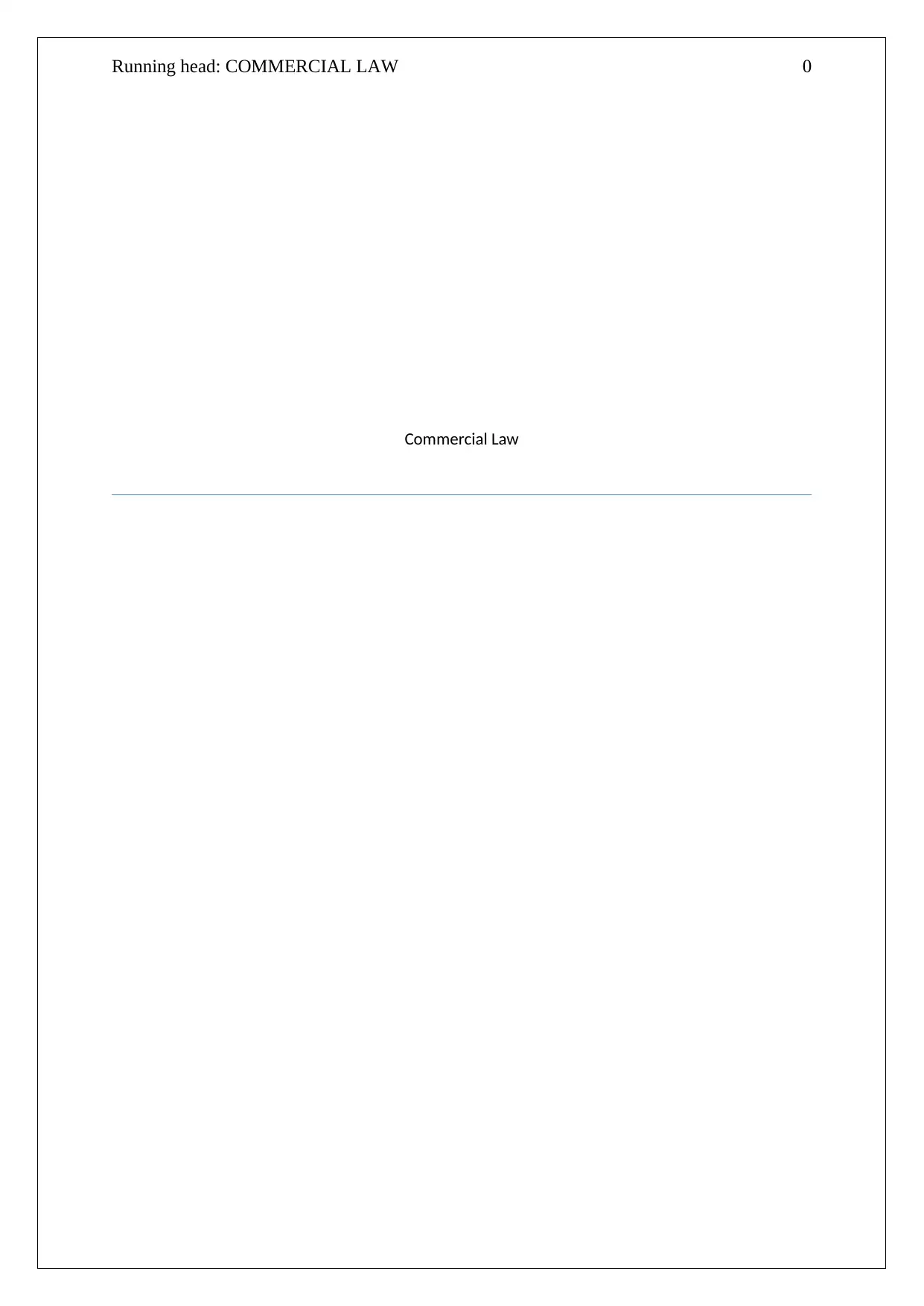
Running head: COMMERCIAL LAW 0
Commercial Law
Commercial Law
Paraphrase This Document
Need a fresh take? Get an instant paraphrase of this document with our AI Paraphraser
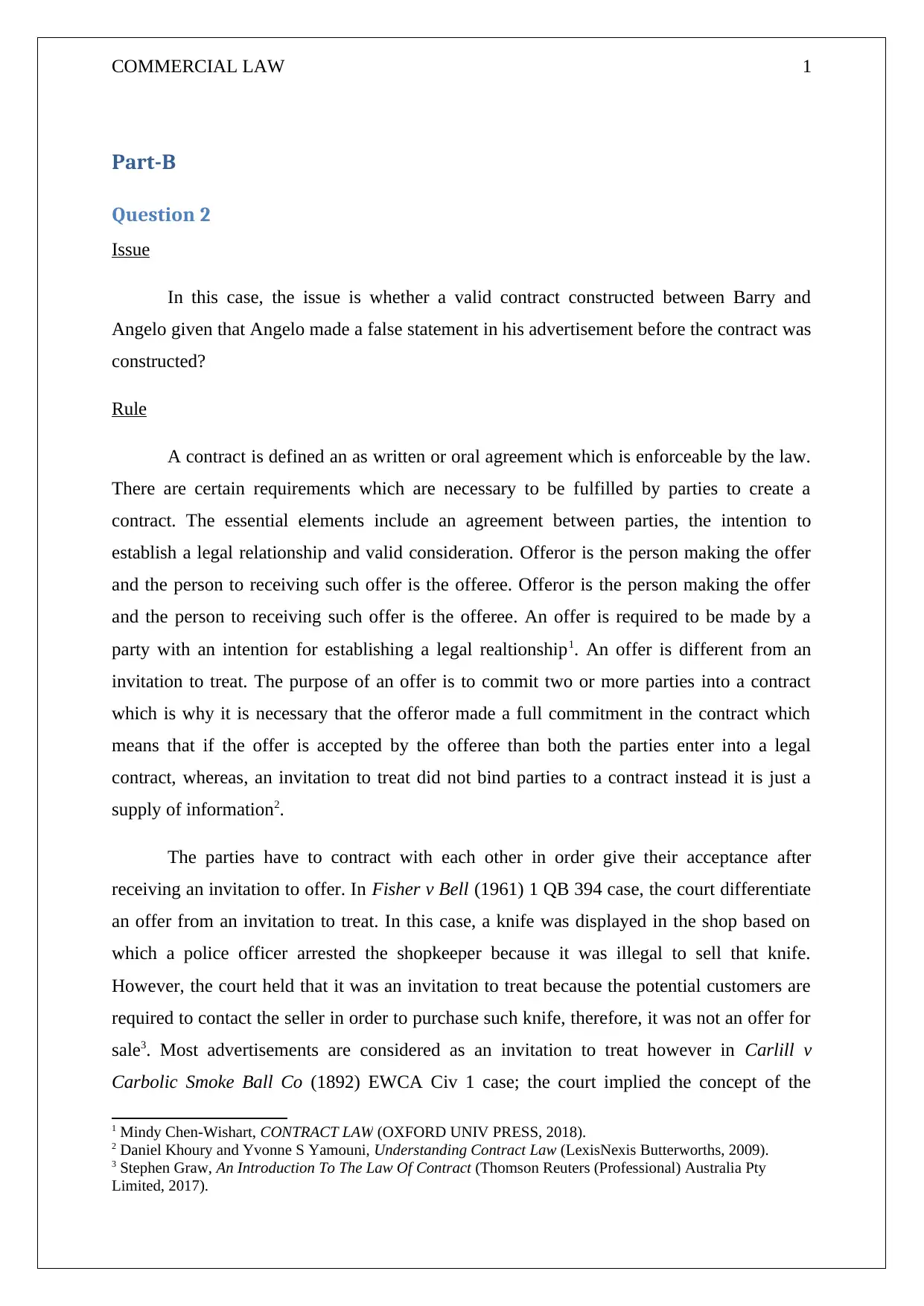
COMMERCIAL LAW 1
Part-B
Question 2
Issue
In this case, the issue is whether a valid contract constructed between Barry and
Angelo given that Angelo made a false statement in his advertisement before the contract was
constructed?
Rule
A contract is defined an as written or oral agreement which is enforceable by the law.
There are certain requirements which are necessary to be fulfilled by parties to create a
contract. The essential elements include an agreement between parties, the intention to
establish a legal relationship and valid consideration. Offeror is the person making the offer
and the person to receiving such offer is the offeree. Offeror is the person making the offer
and the person to receiving such offer is the offeree. An offer is required to be made by a
party with an intention for establishing a legal realtionship1. An offer is different from an
invitation to treat. The purpose of an offer is to commit two or more parties into a contract
which is why it is necessary that the offeror made a full commitment in the contract which
means that if the offer is accepted by the offeree than both the parties enter into a legal
contract, whereas, an invitation to treat did not bind parties to a contract instead it is just a
supply of information2.
The parties have to contract with each other in order give their acceptance after
receiving an invitation to offer. In Fisher v Bell (1961) 1 QB 394 case, the court differentiate
an offer from an invitation to treat. In this case, a knife was displayed in the shop based on
which a police officer arrested the shopkeeper because it was illegal to sell that knife.
However, the court held that it was an invitation to treat because the potential customers are
required to contact the seller in order to purchase such knife, therefore, it was not an offer for
sale3. Most advertisements are considered as an invitation to treat however in Carlill v
Carbolic Smoke Ball Co (1892) EWCA Civ 1 case; the court implied the concept of the
1 Mindy Chen-Wishart, CONTRACT LAW (OXFORD UNIV PRESS, 2018).
2 Daniel Khoury and Yvonne S Yamouni, Understanding Contract Law (LexisNexis Butterworths, 2009).
3 Stephen Graw, An Introduction To The Law Of Contract (Thomson Reuters (Professional) Australia Pty
Limited, 2017).
Part-B
Question 2
Issue
In this case, the issue is whether a valid contract constructed between Barry and
Angelo given that Angelo made a false statement in his advertisement before the contract was
constructed?
Rule
A contract is defined an as written or oral agreement which is enforceable by the law.
There are certain requirements which are necessary to be fulfilled by parties to create a
contract. The essential elements include an agreement between parties, the intention to
establish a legal relationship and valid consideration. Offeror is the person making the offer
and the person to receiving such offer is the offeree. Offeror is the person making the offer
and the person to receiving such offer is the offeree. An offer is required to be made by a
party with an intention for establishing a legal realtionship1. An offer is different from an
invitation to treat. The purpose of an offer is to commit two or more parties into a contract
which is why it is necessary that the offeror made a full commitment in the contract which
means that if the offer is accepted by the offeree than both the parties enter into a legal
contract, whereas, an invitation to treat did not bind parties to a contract instead it is just a
supply of information2.
The parties have to contract with each other in order give their acceptance after
receiving an invitation to offer. In Fisher v Bell (1961) 1 QB 394 case, the court differentiate
an offer from an invitation to treat. In this case, a knife was displayed in the shop based on
which a police officer arrested the shopkeeper because it was illegal to sell that knife.
However, the court held that it was an invitation to treat because the potential customers are
required to contact the seller in order to purchase such knife, therefore, it was not an offer for
sale3. Most advertisements are considered as an invitation to treat however in Carlill v
Carbolic Smoke Ball Co (1892) EWCA Civ 1 case; the court implied the concept of the
1 Mindy Chen-Wishart, CONTRACT LAW (OXFORD UNIV PRESS, 2018).
2 Daniel Khoury and Yvonne S Yamouni, Understanding Contract Law (LexisNexis Butterworths, 2009).
3 Stephen Graw, An Introduction To The Law Of Contract (Thomson Reuters (Professional) Australia Pty
Limited, 2017).
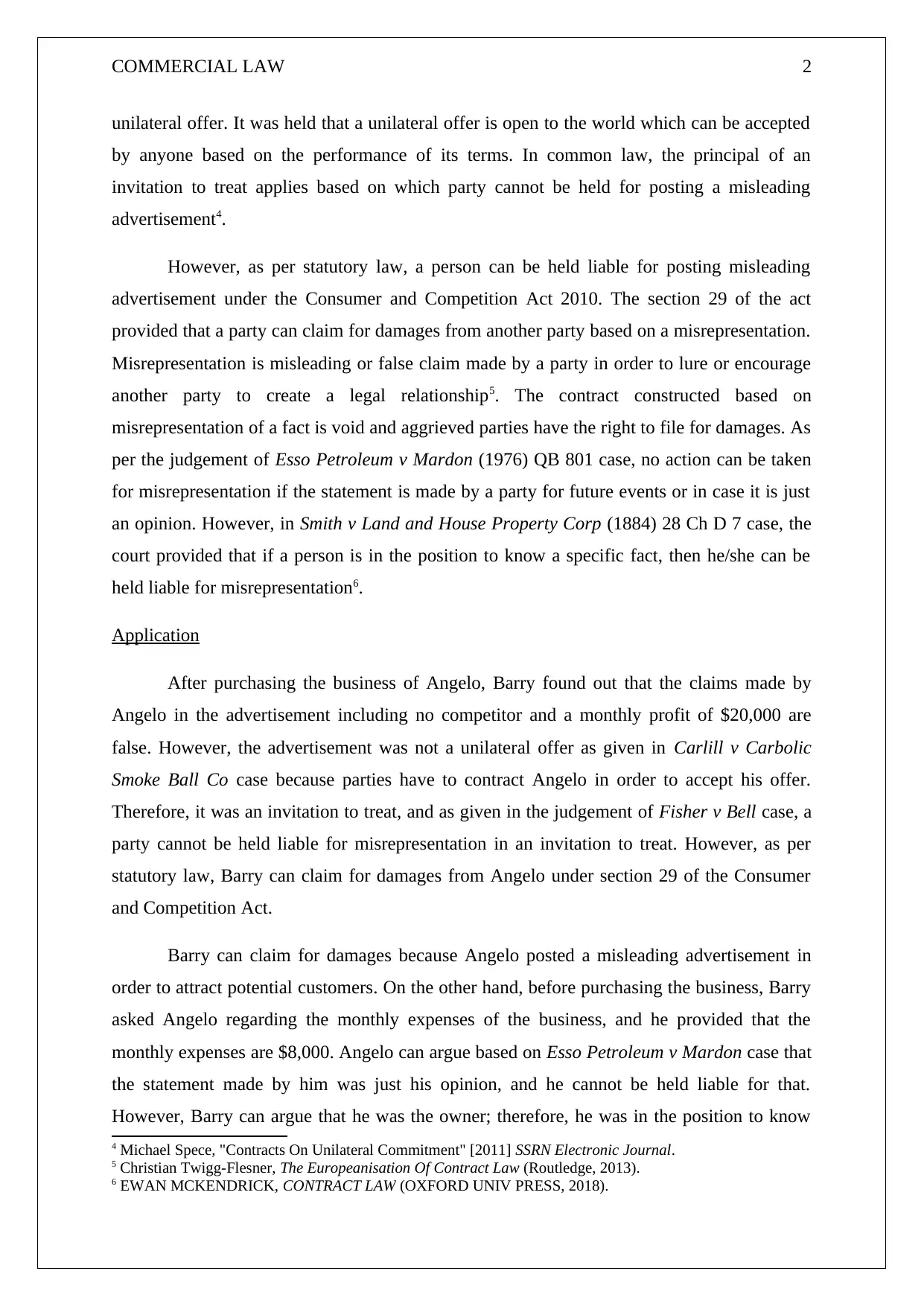
COMMERCIAL LAW 2
unilateral offer. It was held that a unilateral offer is open to the world which can be accepted
by anyone based on the performance of its terms. In common law, the principal of an
invitation to treat applies based on which party cannot be held for posting a misleading
advertisement4.
However, as per statutory law, a person can be held liable for posting misleading
advertisement under the Consumer and Competition Act 2010. The section 29 of the act
provided that a party can claim for damages from another party based on a misrepresentation.
Misrepresentation is misleading or false claim made by a party in order to lure or encourage
another party to create a legal relationship5. The contract constructed based on
misrepresentation of a fact is void and aggrieved parties have the right to file for damages. As
per the judgement of Esso Petroleum v Mardon (1976) QB 801 case, no action can be taken
for misrepresentation if the statement is made by a party for future events or in case it is just
an opinion. However, in Smith v Land and House Property Corp (1884) 28 Ch D 7 case, the
court provided that if a person is in the position to know a specific fact, then he/she can be
held liable for misrepresentation6.
Application
After purchasing the business of Angelo, Barry found out that the claims made by
Angelo in the advertisement including no competitor and a monthly profit of $20,000 are
false. However, the advertisement was not a unilateral offer as given in Carlill v Carbolic
Smoke Ball Co case because parties have to contract Angelo in order to accept his offer.
Therefore, it was an invitation to treat, and as given in the judgement of Fisher v Bell case, a
party cannot be held liable for misrepresentation in an invitation to treat. However, as per
statutory law, Barry can claim for damages from Angelo under section 29 of the Consumer
and Competition Act.
Barry can claim for damages because Angelo posted a misleading advertisement in
order to attract potential customers. On the other hand, before purchasing the business, Barry
asked Angelo regarding the monthly expenses of the business, and he provided that the
monthly expenses are $8,000. Angelo can argue based on Esso Petroleum v Mardon case that
the statement made by him was just his opinion, and he cannot be held liable for that.
However, Barry can argue that he was the owner; therefore, he was in the position to know
4 Michael Spece, "Contracts On Unilateral Commitment" [2011] SSRN Electronic Journal.
5 Christian Twigg-Flesner, The Europeanisation Of Contract Law (Routledge, 2013).
6 EWAN MCKENDRICK, CONTRACT LAW (OXFORD UNIV PRESS, 2018).
unilateral offer. It was held that a unilateral offer is open to the world which can be accepted
by anyone based on the performance of its terms. In common law, the principal of an
invitation to treat applies based on which party cannot be held for posting a misleading
advertisement4.
However, as per statutory law, a person can be held liable for posting misleading
advertisement under the Consumer and Competition Act 2010. The section 29 of the act
provided that a party can claim for damages from another party based on a misrepresentation.
Misrepresentation is misleading or false claim made by a party in order to lure or encourage
another party to create a legal relationship5. The contract constructed based on
misrepresentation of a fact is void and aggrieved parties have the right to file for damages. As
per the judgement of Esso Petroleum v Mardon (1976) QB 801 case, no action can be taken
for misrepresentation if the statement is made by a party for future events or in case it is just
an opinion. However, in Smith v Land and House Property Corp (1884) 28 Ch D 7 case, the
court provided that if a person is in the position to know a specific fact, then he/she can be
held liable for misrepresentation6.
Application
After purchasing the business of Angelo, Barry found out that the claims made by
Angelo in the advertisement including no competitor and a monthly profit of $20,000 are
false. However, the advertisement was not a unilateral offer as given in Carlill v Carbolic
Smoke Ball Co case because parties have to contract Angelo in order to accept his offer.
Therefore, it was an invitation to treat, and as given in the judgement of Fisher v Bell case, a
party cannot be held liable for misrepresentation in an invitation to treat. However, as per
statutory law, Barry can claim for damages from Angelo under section 29 of the Consumer
and Competition Act.
Barry can claim for damages because Angelo posted a misleading advertisement in
order to attract potential customers. On the other hand, before purchasing the business, Barry
asked Angelo regarding the monthly expenses of the business, and he provided that the
monthly expenses are $8,000. Angelo can argue based on Esso Petroleum v Mardon case that
the statement made by him was just his opinion, and he cannot be held liable for that.
However, Barry can argue that he was the owner; therefore, he was in the position to know
4 Michael Spece, "Contracts On Unilateral Commitment" [2011] SSRN Electronic Journal.
5 Christian Twigg-Flesner, The Europeanisation Of Contract Law (Routledge, 2013).
6 EWAN MCKENDRICK, CONTRACT LAW (OXFORD UNIV PRESS, 2018).
⊘ This is a preview!⊘
Do you want full access?
Subscribe today to unlock all pages.

Trusted by 1+ million students worldwide
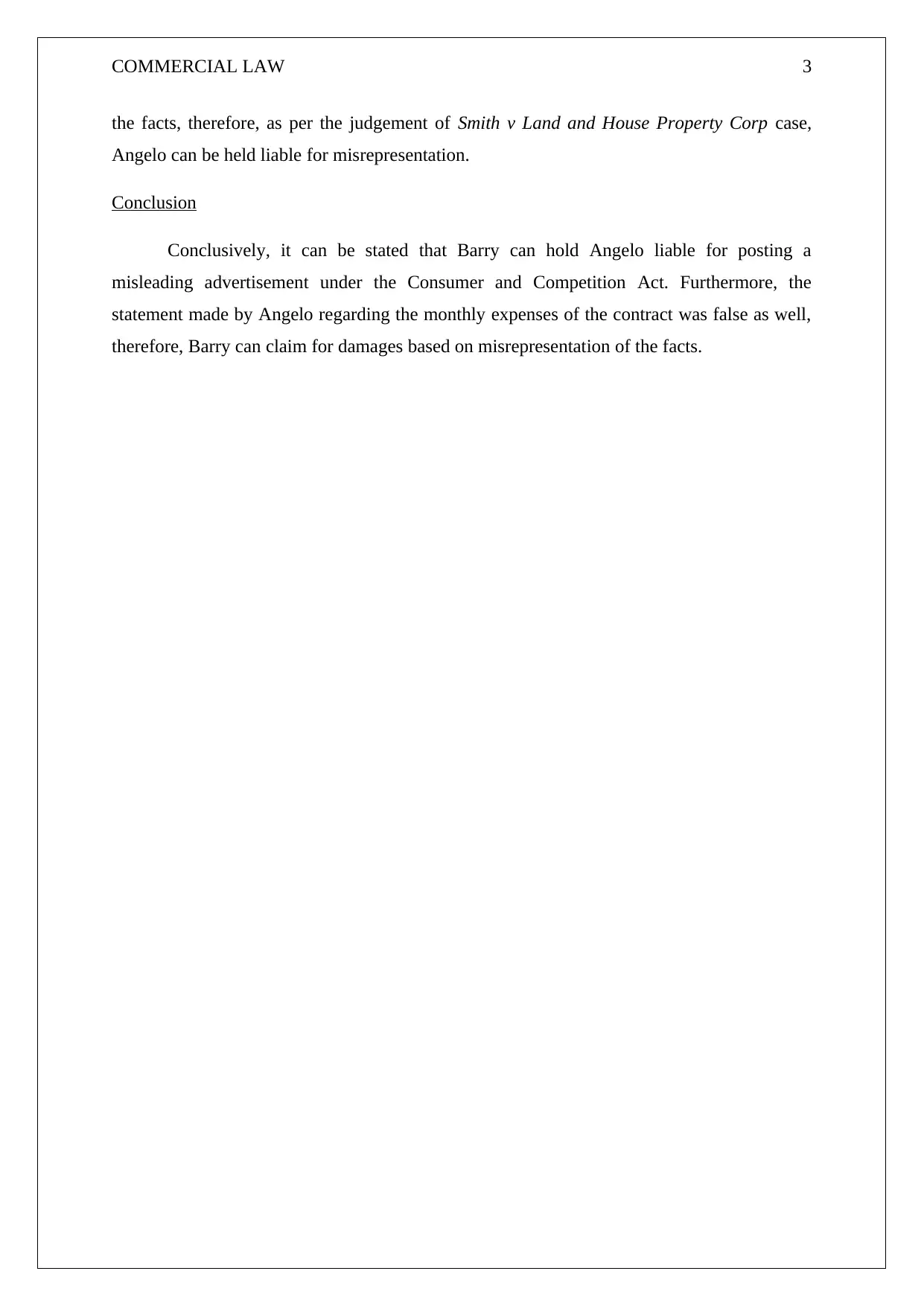
COMMERCIAL LAW 3
the facts, therefore, as per the judgement of Smith v Land and House Property Corp case,
Angelo can be held liable for misrepresentation.
Conclusion
Conclusively, it can be stated that Barry can hold Angelo liable for posting a
misleading advertisement under the Consumer and Competition Act. Furthermore, the
statement made by Angelo regarding the monthly expenses of the contract was false as well,
therefore, Barry can claim for damages based on misrepresentation of the facts.
the facts, therefore, as per the judgement of Smith v Land and House Property Corp case,
Angelo can be held liable for misrepresentation.
Conclusion
Conclusively, it can be stated that Barry can hold Angelo liable for posting a
misleading advertisement under the Consumer and Competition Act. Furthermore, the
statement made by Angelo regarding the monthly expenses of the contract was false as well,
therefore, Barry can claim for damages based on misrepresentation of the facts.
Paraphrase This Document
Need a fresh take? Get an instant paraphrase of this document with our AI Paraphraser
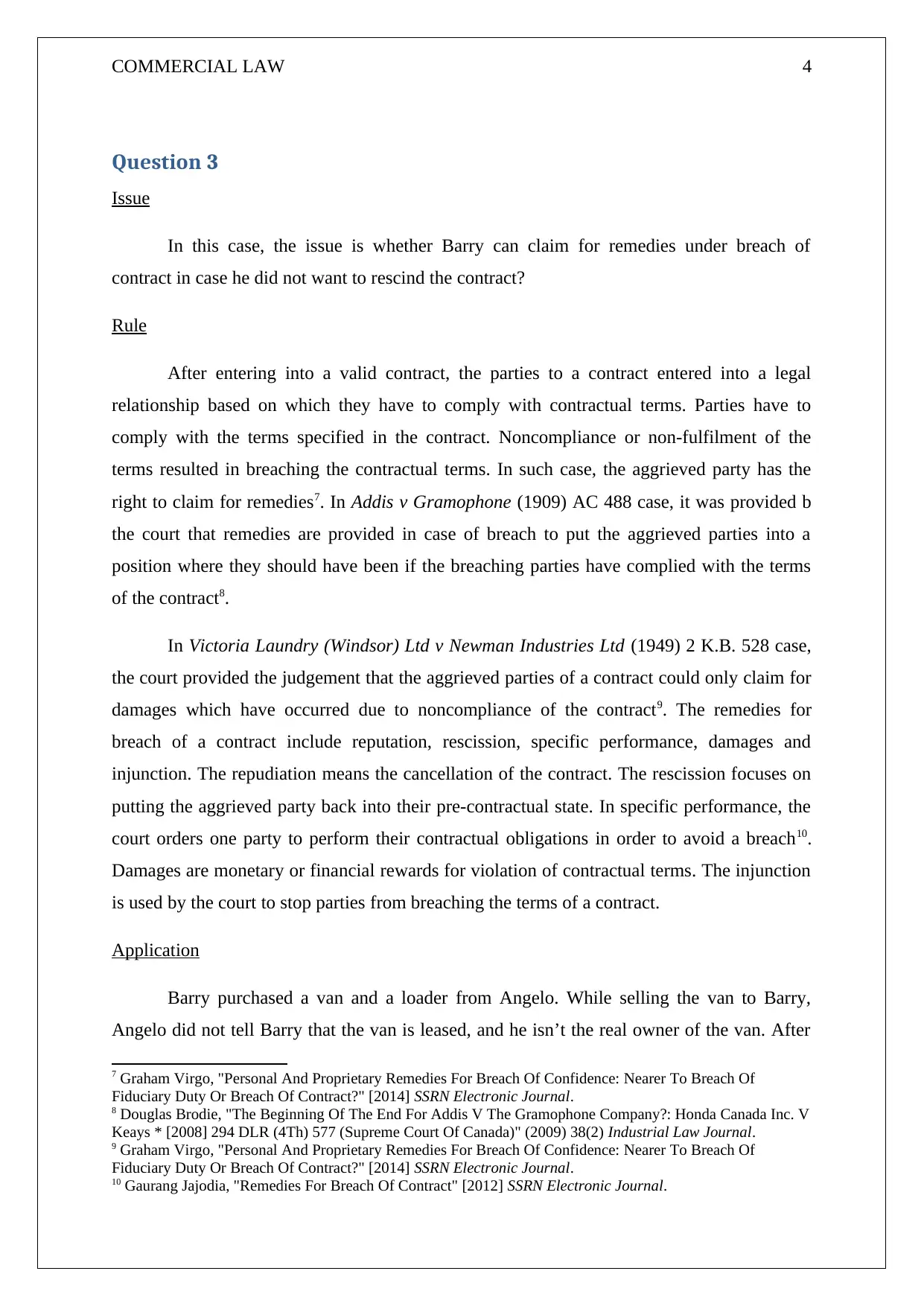
COMMERCIAL LAW 4
Question 3
Issue
In this case, the issue is whether Barry can claim for remedies under breach of
contract in case he did not want to rescind the contract?
Rule
After entering into a valid contract, the parties to a contract entered into a legal
relationship based on which they have to comply with contractual terms. Parties have to
comply with the terms specified in the contract. Noncompliance or non-fulfilment of the
terms resulted in breaching the contractual terms. In such case, the aggrieved party has the
right to claim for remedies7. In Addis v Gramophone (1909) AC 488 case, it was provided b
the court that remedies are provided in case of breach to put the aggrieved parties into a
position where they should have been if the breaching parties have complied with the terms
of the contract8.
In Victoria Laundry (Windsor) Ltd v Newman Industries Ltd (1949) 2 K.B. 528 case,
the court provided the judgement that the aggrieved parties of a contract could only claim for
damages which have occurred due to noncompliance of the contract9. The remedies for
breach of a contract include reputation, rescission, specific performance, damages and
injunction. The repudiation means the cancellation of the contract. The rescission focuses on
putting the aggrieved party back into their pre-contractual state. In specific performance, the
court orders one party to perform their contractual obligations in order to avoid a breach10.
Damages are monetary or financial rewards for violation of contractual terms. The injunction
is used by the court to stop parties from breaching the terms of a contract.
Application
Barry purchased a van and a loader from Angelo. While selling the van to Barry,
Angelo did not tell Barry that the van is leased, and he isn’t the real owner of the van. After
7 Graham Virgo, "Personal And Proprietary Remedies For Breach Of Confidence: Nearer To Breach Of
Fiduciary Duty Or Breach Of Contract?" [2014] SSRN Electronic Journal.
8 Douglas Brodie, "The Beginning Of The End For Addis V The Gramophone Company?: Honda Canada Inc. V
Keays * [2008] 294 DLR (4Th) 577 (Supreme Court Of Canada)" (2009) 38(2) Industrial Law Journal.
9 Graham Virgo, "Personal And Proprietary Remedies For Breach Of Confidence: Nearer To Breach Of
Fiduciary Duty Or Breach Of Contract?" [2014] SSRN Electronic Journal.
10 Gaurang Jajodia, "Remedies For Breach Of Contract" [2012] SSRN Electronic Journal.
Question 3
Issue
In this case, the issue is whether Barry can claim for remedies under breach of
contract in case he did not want to rescind the contract?
Rule
After entering into a valid contract, the parties to a contract entered into a legal
relationship based on which they have to comply with contractual terms. Parties have to
comply with the terms specified in the contract. Noncompliance or non-fulfilment of the
terms resulted in breaching the contractual terms. In such case, the aggrieved party has the
right to claim for remedies7. In Addis v Gramophone (1909) AC 488 case, it was provided b
the court that remedies are provided in case of breach to put the aggrieved parties into a
position where they should have been if the breaching parties have complied with the terms
of the contract8.
In Victoria Laundry (Windsor) Ltd v Newman Industries Ltd (1949) 2 K.B. 528 case,
the court provided the judgement that the aggrieved parties of a contract could only claim for
damages which have occurred due to noncompliance of the contract9. The remedies for
breach of a contract include reputation, rescission, specific performance, damages and
injunction. The repudiation means the cancellation of the contract. The rescission focuses on
putting the aggrieved party back into their pre-contractual state. In specific performance, the
court orders one party to perform their contractual obligations in order to avoid a breach10.
Damages are monetary or financial rewards for violation of contractual terms. The injunction
is used by the court to stop parties from breaching the terms of a contract.
Application
Barry purchased a van and a loader from Angelo. While selling the van to Barry,
Angelo did not tell Barry that the van is leased, and he isn’t the real owner of the van. After
7 Graham Virgo, "Personal And Proprietary Remedies For Breach Of Confidence: Nearer To Breach Of
Fiduciary Duty Or Breach Of Contract?" [2014] SSRN Electronic Journal.
8 Douglas Brodie, "The Beginning Of The End For Addis V The Gramophone Company?: Honda Canada Inc. V
Keays * [2008] 294 DLR (4Th) 577 (Supreme Court Of Canada)" (2009) 38(2) Industrial Law Journal.
9 Graham Virgo, "Personal And Proprietary Remedies For Breach Of Confidence: Nearer To Breach Of
Fiduciary Duty Or Breach Of Contract?" [2014] SSRN Electronic Journal.
10 Gaurang Jajodia, "Remedies For Breach Of Contract" [2012] SSRN Electronic Journal.
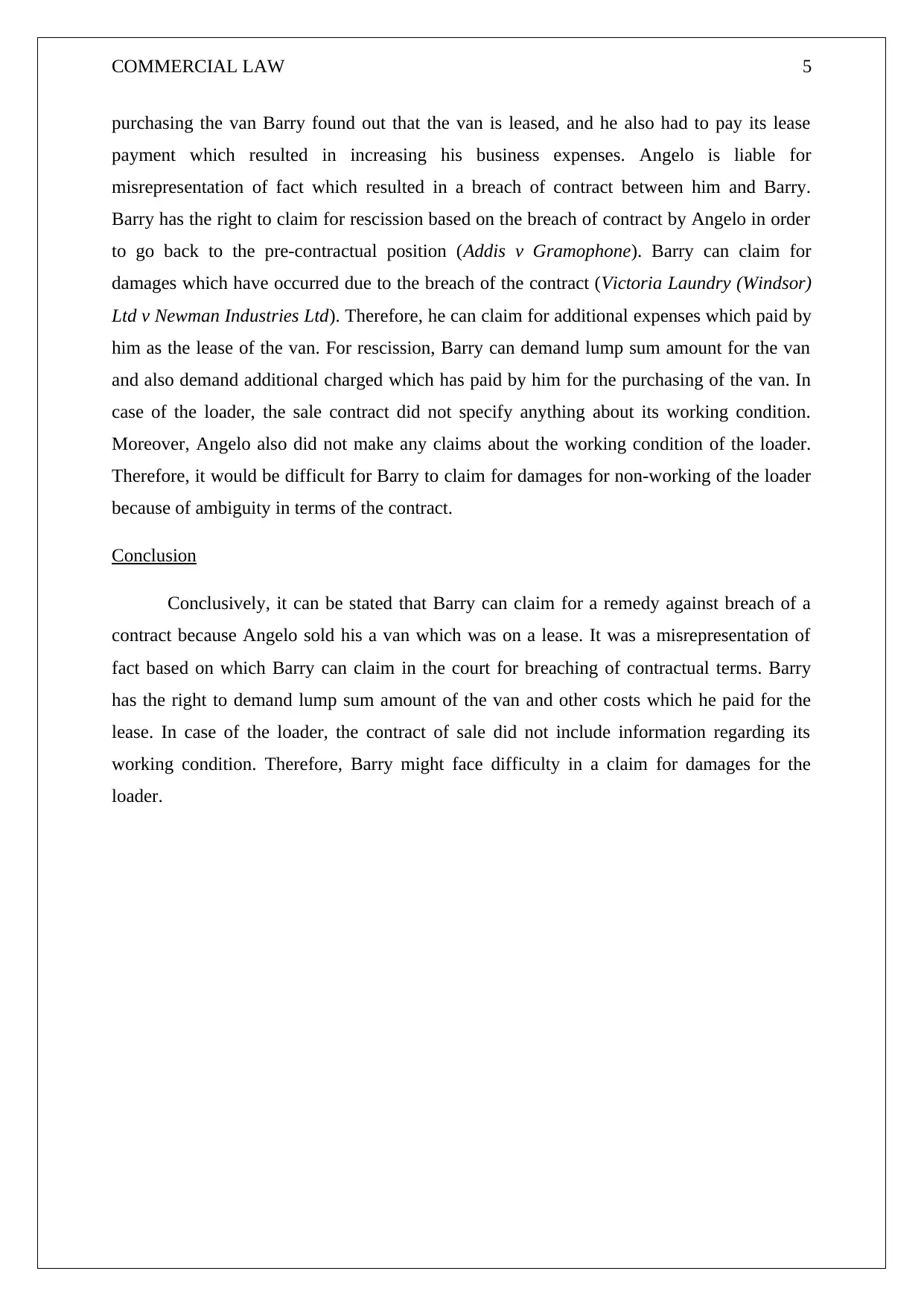
COMMERCIAL LAW 5
purchasing the van Barry found out that the van is leased, and he also had to pay its lease
payment which resulted in increasing his business expenses. Angelo is liable for
misrepresentation of fact which resulted in a breach of contract between him and Barry.
Barry has the right to claim for rescission based on the breach of contract by Angelo in order
to go back to the pre-contractual position (Addis v Gramophone). Barry can claim for
damages which have occurred due to the breach of the contract (Victoria Laundry (Windsor)
Ltd v Newman Industries Ltd). Therefore, he can claim for additional expenses which paid by
him as the lease of the van. For rescission, Barry can demand lump sum amount for the van
and also demand additional charged which has paid by him for the purchasing of the van. In
case of the loader, the sale contract did not specify anything about its working condition.
Moreover, Angelo also did not make any claims about the working condition of the loader.
Therefore, it would be difficult for Barry to claim for damages for non-working of the loader
because of ambiguity in terms of the contract.
Conclusion
Conclusively, it can be stated that Barry can claim for a remedy against breach of a
contract because Angelo sold his a van which was on a lease. It was a misrepresentation of
fact based on which Barry can claim in the court for breaching of contractual terms. Barry
has the right to demand lump sum amount of the van and other costs which he paid for the
lease. In case of the loader, the contract of sale did not include information regarding its
working condition. Therefore, Barry might face difficulty in a claim for damages for the
loader.
purchasing the van Barry found out that the van is leased, and he also had to pay its lease
payment which resulted in increasing his business expenses. Angelo is liable for
misrepresentation of fact which resulted in a breach of contract between him and Barry.
Barry has the right to claim for rescission based on the breach of contract by Angelo in order
to go back to the pre-contractual position (Addis v Gramophone). Barry can claim for
damages which have occurred due to the breach of the contract (Victoria Laundry (Windsor)
Ltd v Newman Industries Ltd). Therefore, he can claim for additional expenses which paid by
him as the lease of the van. For rescission, Barry can demand lump sum amount for the van
and also demand additional charged which has paid by him for the purchasing of the van. In
case of the loader, the sale contract did not specify anything about its working condition.
Moreover, Angelo also did not make any claims about the working condition of the loader.
Therefore, it would be difficult for Barry to claim for damages for non-working of the loader
because of ambiguity in terms of the contract.
Conclusion
Conclusively, it can be stated that Barry can claim for a remedy against breach of a
contract because Angelo sold his a van which was on a lease. It was a misrepresentation of
fact based on which Barry can claim in the court for breaching of contractual terms. Barry
has the right to demand lump sum amount of the van and other costs which he paid for the
lease. In case of the loader, the contract of sale did not include information regarding its
working condition. Therefore, Barry might face difficulty in a claim for damages for the
loader.
⊘ This is a preview!⊘
Do you want full access?
Subscribe today to unlock all pages.

Trusted by 1+ million students worldwide
1 out of 6
Related Documents
Your All-in-One AI-Powered Toolkit for Academic Success.
+13062052269
info@desklib.com
Available 24*7 on WhatsApp / Email
![[object Object]](/_next/static/media/star-bottom.7253800d.svg)
Unlock your academic potential
Copyright © 2020–2026 A2Z Services. All Rights Reserved. Developed and managed by ZUCOL.





